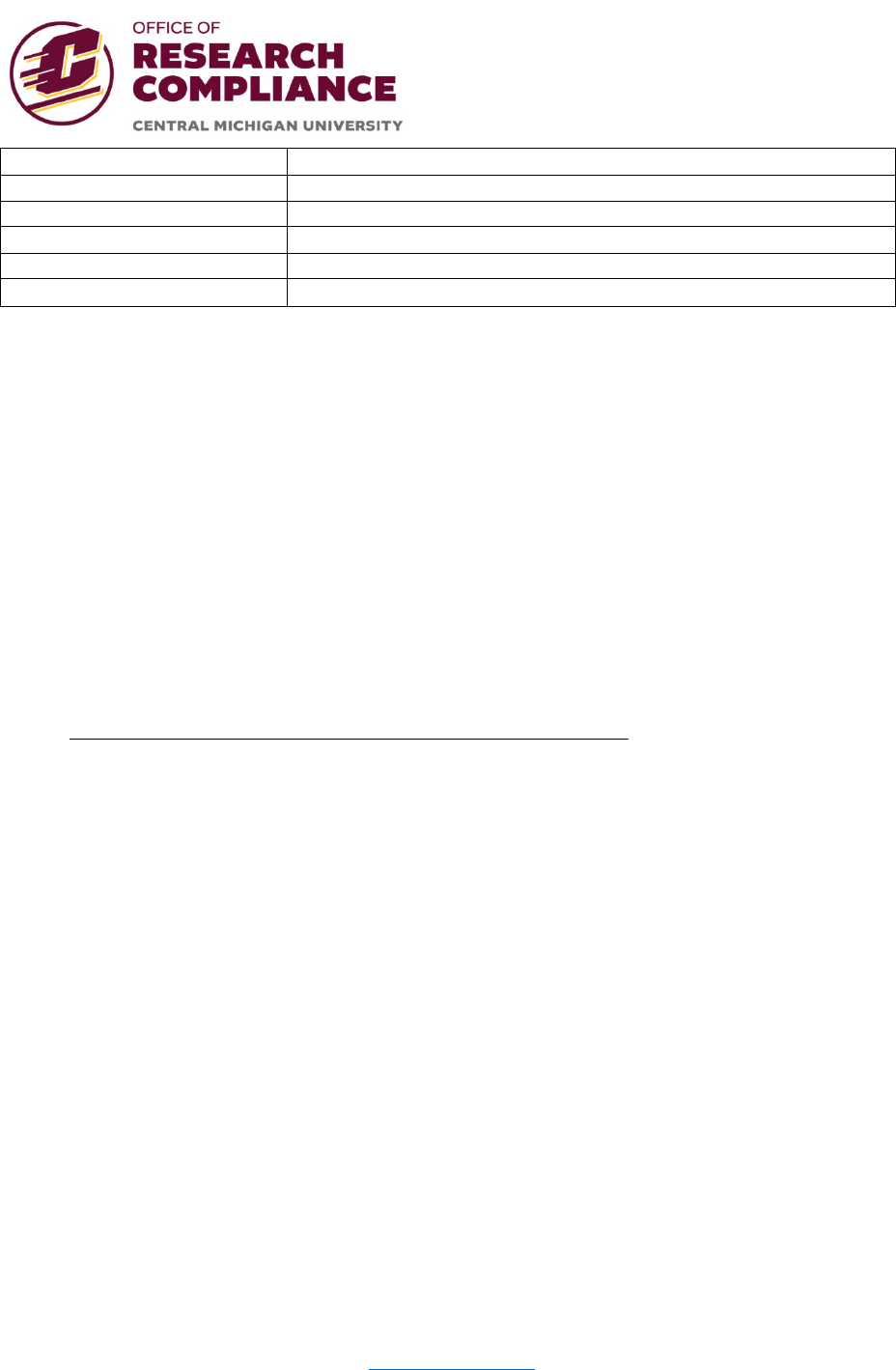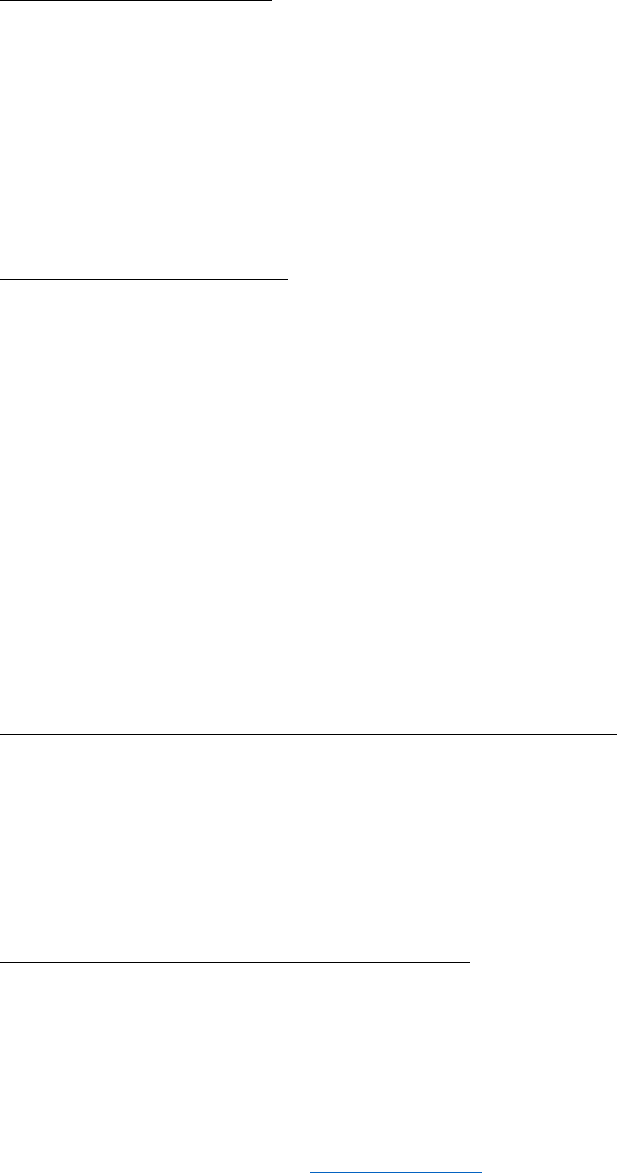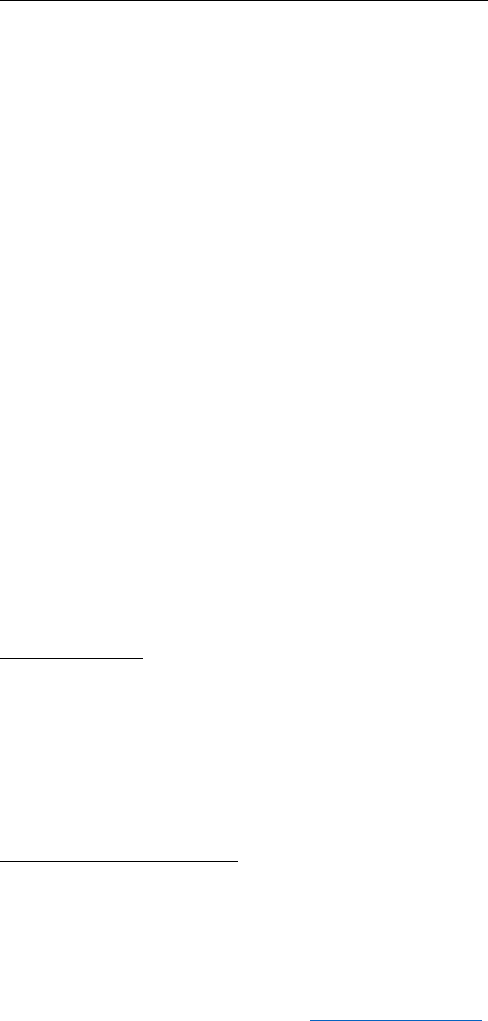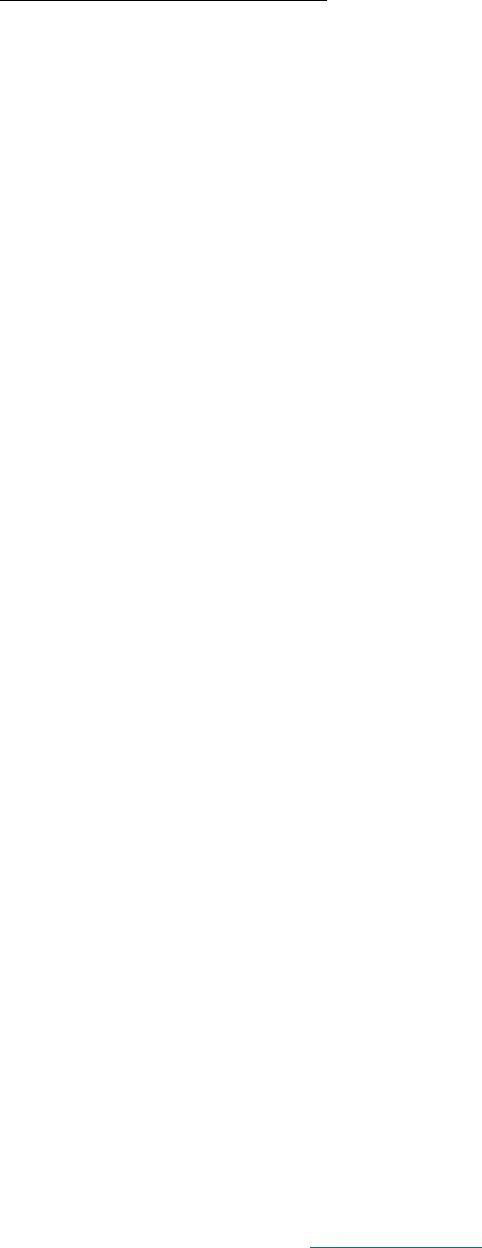
Institutional Animal Care and Use Committee
Foust 104, Central Michigan University
Mt. Pleasant, MI 48859
IACUC_A[email protected]
Phone: 989.774.6401
Title
Program for Veterinary Care
Policy Number
IACUC-006
Original Approval Date
December 1
st
, 2016
Revision Date / Author Initials
July 20, 2023 / AV, CV
Revision History Dates
12.1.16, 9.27.17
Authorized by
IACUC/IO
I. PURPOSE
This policy outlines the Program for Veterinary Care for the Animal Care and Use program at Central
Michigan University and describes the responsibility and authority of the Attending Veterinarian and
Clinical Veterinarian.
II. SCOPE
This policy applies to all animals used in teaching, research or outreach activities conducted at
Central Michigan University that are subject to oversight by the Institutional Animal Care and Use
Committee (IACUC) and the Institutional Official as described in the CMU Assurance to the Public
Health Service (PHS).
III. POLICY
A. Authority of the Attending Veterinarian and Clinical Veterinarian
1. Authority and responsibility for veterinary activities involving animals at CMU are
delegated to the Attending Veterinarian (AV) and Clinical Veterinarian (CV) by the CMU
Institutional Official (IO). As described in the CMU Assurance to the Public Health
Service, and in compliance with The Guide for Care and Use of Laboratory Animals, the
Animal Welfare Act and PHS Policy, the AV is responsible for the health and well-being
of all animals at Central Michigan University.
2. The AV at CMU is responsible for all the duties listed in the Animal Welfare Act
Regulations (AWAR) §2.33
1
, The Guide for the Care and Use of Laboratory Animals 8th
Edition
2
(The Guide) and listed in The IACUC Handbook Third Edition
3
.
3. In accordance with The Guide and AWAR §2.33, the University affirms that the AV has
sufficient authority, including access to all animals, and resources to manage the program
of veterinary care. The University fully authorizes the AV to provide medical care and, if
necessary, euthanasia to all animals used in teaching, research, or outreach activities.
4. This policy pertains to the AV or his/her designee(s) under the authority and/or direction
of the AV. Whenever reasonably possible, the AV or designee will solicit the input of the
Principal Investigator (PI) or responsible research staff member(s) prior to implementing
treatment or euthanasia of a research animal. The AV is not required to obtain approval
from the Principal Investigator or any other parties prior to providing treatment or
euthanasia to research animals.
a. If the responsible research staff member and the AV or designee disagree regarding
the need for animal treatment or euthanasia, the AV is authorized to implement any
and all actions deemed necessary based on her/his medical judgment.

IACUC-006 Policy Page 2 of 4
Institutional Animal Care and Use Committee
Foust 104, Central Michigan University
Mt. Pleasant, MI 48859
IACUC_A[email protected]
Phone: 989.774.6401
b. In extreme and rare circumstances, it may be necessary for the AV or designee to
implement animal treatment or euthanasia prior to contacting the PI or responsible
research staff member.
c. The AV or designee will promptly notify the PI or responsible research staff of the
animal treatment or euthanasia.
B. Veterinary Staff Qualifications
1. Attending veterinary care and clinical veterinary care are provided at Central Michigan
University via contract.
2. The AV and CV will be board certified by the American College of Laboratory Animal
Medicine or have appropriate training or experience in laboratory animal science and
medicine.
3. Because the AV and CV are not on-site on a routine basis, daily observation and reporting of
veterinary care are provided by phone or internet to the AV/CV by vivarium or research staff.
4. Animal care staff will be certified appropriate to their delegated duties or have training as
deemed appropriate to their delegated animal care responsibilities by the AV.
C. Facilities and Access to Animals
1. Animal housing and research areas will be used solely for teaching, research and outreach
activities approved by the Central Michigan University (CMU) IACUC.
2. CMU and individual PIs are responsible for providing the facilities and equipment needed to
appropriately care for animals. The AV shall be available for consultation on the procurement
and operation of equipment and facilities used for animal care and use.
3. The AV or CV will have unfettered access to facilities.
4. The AV and CV will visit facilities periodically as needed. During these visits, the
veterinarian may participate in an IACUC meeting, tour the animal facilities, confer with
vivarium managers, review issues related to animals on treatment or observation, meet with
compliance staff, and confer with researchers and others regarding issues of animal care and
use.
5. The AV and CV provide preliminary review and advice to PI’s regarding IACUC protocols
via on site interviews, internet, or phone.
6. The AV and CV receive reports and confer as needed (7 days per week availability) with the
vivarium managers, research staff, and compliance staff via phone and internet to address
clinical, facility, husbandry, and experimental use issues.
D. Provisions for Veterinary Care at the Beaver Island Biological Station
1. Animals are housed on Beaver Island only during the summer months.
2. The Director or manager of the facility contacts the AV or the CV whenever there are questions
or issues of concern.
3. In the event of an emergency, a locally based private practice veterinarian will be utilized as a
backup veterinarian as needed.
4. The animal facilities manager coordinates responsibility for care with the research team.
5. The routine census is approximately 100 fish.
E. Animal Procurement, Transportation, and Quarantine
1. To prevent disease, the institutional goal is to procure selected pathogen free animals, when
available.
2. Every effort will be made to maintain separation of species and animals of defined health
status from animals with unknown health status to limit the transmission of disease.

IACUC-006 Policy Page 3 of 4
Institutional Animal Care and Use Committee
Foust 104, Central Michigan University
Mt. Pleasant, MI 48859
IACUC_A[email protected]
Phone: 989.774.6401
3. Potential vendors will be evaluated for the quality of animals supplied by them and the ability
to provide information on genetics and pathogen status, when available. Similar information
will be obtained on animals received from other institutions.
4. Animals will be transported both on and off campus using methods to avoid the risk of
zoonoses, provide protection against the environment, overcrowding, and physical trauma and
allow for access to food and water, when indicated.
5. Newly arrived animals will be quarantined and stabilized for periods long enough to assess
their health status, reduce shipping stress, and adapt to the new environment. This will vary
depending on the species, source of animals and planned use.
6. For farm animals, wild animals and random source animals, appropriate quarantine and
isolation procedures must be employed.
F. Disease Control and Prevention and Clinical Treatment
1. The AV and CV have established, maintain, and supervise programs of disease control
and prevention, as well as pest and parasite control, through vendor surveillance and
quarantine of animals procured from non-approved sources; daily monitoring of animals
for clinical problems by the animal facility staff; and conferring on observations by the
animal facility staff when issues arise.
2. The AV and CV are responsible for issuing and periodically updating standing treatment
orders and assessment mechanisms for commonly occurring clinical issues and for
authorizing specified personnel to carry out these standing treatment orders.
3. Disease surveillance is a major component of the veterinary program. Animal colonies will
be routinely monitored for the presence of parasitic, bacterial, and viral agents that may
cause clinical or subclinical disease.
4. Diagnosis of animal disease will be the responsibility of the veterinarians. When illness or
injury is discovered, the PI, or his/her designated back-up(s) should discuss the situation
with the veterinarian(s) to determine a course of action consistent with the research goals
and IACUC approved activity. Actions may include treatment, relief of pain and suffering
and/or euthanasia.
5. Animals with infectious diseases will be isolated from others in separate locations
appropriate for disease containment. If the whole colony might be potentially infected, it
may be left in location for monitoring and/or treatment.
a. The CV and vivarium managers are authorized by the AV to have the authority to protect
the health and well-being of the institution's animal colonies in collaboration with
research investigators to determine best courses of action.
b. This authority should be exercised with the concurrence of the IACUC and the IO
whenever practicable.
G. Oversight/Other
1. Pre-procedural and post-procedural care, nutrition, euthanasia, and animal enrichment are
established through IACUC policies, veterinary consultations with research staff, and defined
in IACUC approved protocols.
2. Activities defined in IACUC approved protocols will be monitored and any unanticipated
clinical problems will be addressed by the AV and CV. The AV and CV confer on these
issues via internet, phone, and on-site visits.
H. Field Researcher Guidance
1. If CMU field researchers observe animals exhibiting abnormal behavior, and the animals
have not been handled as part of an IACUC approved study, researchers are not responsible
for providing treatment/care.

IACUC-006 Policy Page 4 of 4
Institutional Animal Care and Use Committee
Foust 104, Central Michigan University
Mt. Pleasant, MI 48859
IACUC_A[email protected]
Phone: 989.774.6401
2. CMU researchers are encouraged to report their observations to local authorities, e.g., DNR,
local law enforcement, when appropriate.
I. 24-Hour Emergency Veterinary Care
1. It is the policy of Central Michigan University to provide 24 emergency veterinary care to all
animals utilized in research.
2. To facilitate 24-hour emergency care, individuals observing animals that appear to be sick
and/or appear to be in pain or distress are expected to contact the PI, the contact people listed
on the animal protocol form, the vivarium manager, or veterinarians.
3. The names and telephone numbers must be posted on the animal room door.
4. If the animal is suffering pain or distress, prompt medical treatment must be provided, or
euthanasia must be performed.
5. If the PI or contact people listed cannot be located, or are unwilling to make the decision
expeditiously, then the responsibility rests with the veterinarians or vivarium manager.
6. Veterinary care consultation may be provided via phone or internet.
IV. REFERENCES
1. Animal Welfare Act and Animal Welfare Regulations (2022) pp. 60-61. Published by
United States Department of Agriculture Animal Plant Health Inspection Service.
2. The Guide for the Care and Use of Laboratory Animals 8th Edition (2011), National
Academies Press, Washington DC
3. Silverman, J., Suckow, M.A., Murthy, S eds. (2014) The IACUC Handbook Third
Edition p. 625. Published by Taylor & Francis.
